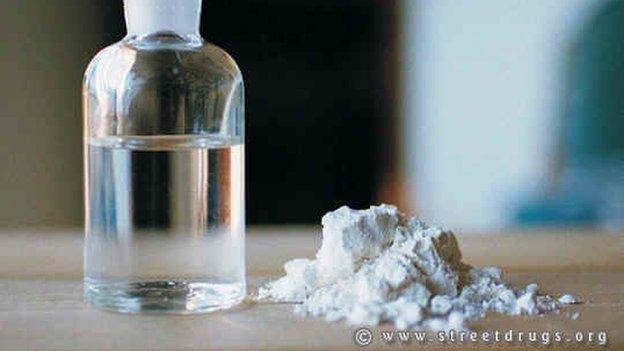Here's why Lincoln has a problem with legal highs
- Published

As Lincoln became the first city in the UK to ban legal highs, the question is, why there?
It seems a random place to have the problem.
But the people whose job it is to safety in the city say where it is has a big part to play in the rise of legal highs.
Pat Coates from Lincolnshire Police has told Newsbeat there are issues there around the purity and availability of illegal drugs in the areas.
That means people have turned to legal highs as an alternative.
He thinks this could be the case in other rural areas too.
Also, for a time there were two legal high shops competing with one another in the city, increasingly availability and lowing prices.
Sam Barstow's the service manager responsible for public protection and anti-social behaviour at Lincoln City Council.
"Lincoln certainly isn't alone in terms of this issue in relation to legal highs.
"What we do know is that legal highs have been around for a lot longer than people originally anticipate," he said.
"We really saw them rise to prominence from about 2008 onwards and that was to do with global issues with production of substances like MDMA, which is a key component in Ecstasy.
"We're aware it's due to a world-wide shortage of something that's called Sassafras oil, which is one of the essential components in the production of MDMA."

With legal highs having a higher profile, Dr Adam Winstock, director of The Global Drug Survey, thinks businesses are capitalising.
"When you go to rural areas you haven't got very well developed dealing networks, I think high street shops are exploiting that.
"The reality is if you put most people on a desert island, and they have access to good quality cocaine, MDMA or cannabis, very few research chemicals would get a look in."
Dr Winstock doubts whether a ban would actually reduce use of legal highs.
"Banning will reduce access, reducing access at some level will reduce use, but my guess is one consequence will be an increased delivery online, displacement of people going to legal high shops in other nearby cities, and possibly a return to a more thriving traditional illicit drug market."
Meanwhile the government is already trying to restrict the use of legal highs in other ways.
Crime Prevention Minister Lynne Featherstone said:
"So-called 'legal highs' have ruined lives and caused a number of deaths, and the government is determined to clamp down on the head shops and suppliers involved in this reckless trade.
"We have already banned more than 500 new psychoactive substances (NPS), created the Forensic Early Warning System to identify new drugs and we support law enforcement action by sharing the latest intelligence with them.
"We are now developing proposals for a general ban on supply across the UK, similar to that introduced in Ireland. This would give the police and law enforcement greater powers to tackle the market directly."
Follow @BBCNewsbeat, external on Twitter, BBCNewsbeat, external on Instagram and Radio1Newsbeat, external on YouTube